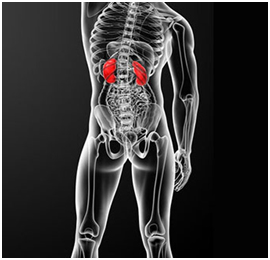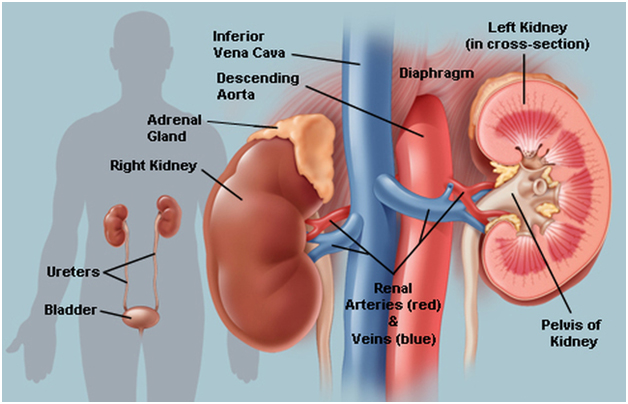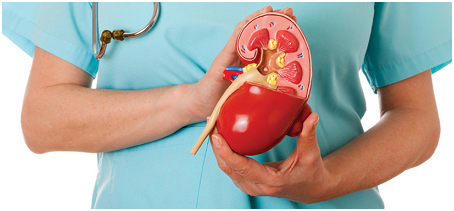Kidney Failure
Your kidneys are a pair of organs located toward your lower back. One kidney is on each side of your spine. They filter your blood and remove toxins from your body. Your kidneys send toxins to your bladder. Your body later removes toxins during urination.
Kidney failure occurs when your kidneys lose the ability to filter waste from your blood sufficiently. Many factors can interfere with your kidney health and function, such as:
- toxic exposure to environmental pollutants or certain medications
- certain acute and chronic diseases
- severe dehydration
- kidney trauma
Your body becomes overloaded with toxins if your kidneys canít do their regular job. This can lead to kidney failure and even be life-threatening if itís left untreated.

What are the symptoms of kidney disease?
With kidney diseases, the first symptoms you may have are ones that you won't feel but that will show up in tests that your doctor orders. Common problems are high blood pressure, anaemia and weakening bones. Knowing the symptoms of kidney disease can help people detect it early enough to get treatment. Symptoms can include:
- Changes in urination including making more or less urine than usual, feeling pressure when urinating, changes in the colour of urine, foamy or bubbly urine, or having to get up at night to urinate
- Swelling of the feet, ankles, hands, or face due to fluid the kidneys can't remove which may stay in the tissues
- Fatigue or weakness due to a build-up of wastes or a shortage of red blood cells (anaemia) can cause these problems when the kidneys begin to fail
- Shortness of breath: Kidney failure is sometimes confused with asthma or heart failure, because fluid can build up in the lungs
- Ammonia breath or an ammonia or metal taste in the mouth: Waste build-up in the body can cause bad breath, changes in taste, or an aversion to protein foods like meat
- Back or flank pain: The kidneys are located on either side of the spine in the back
- Itching: Waste build-up in the body can cause severe itching, especially of the legs
- Loss of appetite
- Nausea and vomiting
What causes kidney failure?
People who are most at risk for kidney failure usually have one or more of the following causes:
Loss of blood flow to the kidneys
A sudden loss of blood flow to your kidneys can prompt kidney failure. Some diseases and conditions that cause loss of blood flow to the kidneys include:
- a heart attack
- heart disease
- scarring of the liver or liver failure
- dehydration
- a severe burn
- an allergic reaction
- a severe infection, such as sepsis
High blood pressure and anti-inflammatory medications can also limit blood flow.
When your body canít eliminate urine, toxins build up and overload the kidneys. Some cancers can block the urine passageways. These include prostate (most common type in men), colon, cervical, and bladder cancers.
Other conditions can interfere with urination and possibly lead to kidney failure, including:
- kidney stones
- an enlarged prostate
- blood clots within your urinary tract
- damage to the nerves that control your bladder

Five types of kidney failure
There are five different types of kidney failure:
Acute prerenal kidney failure
Insufficient blood flow to the kidneys can cause acute prerenal kidney failure. The kidneys canít filter toxins from the blood without enough blood flow. This type of kidney failure can usually be cured once you and your doctor determine the cause of the decreased blood flow.
Acute intrinsic kidney failure
Acute intrinsic kidney failure can be caused by direct trauma to the kidneys, such as physical impact or an accident. Causes also include toxin overload and ischemia, which is a lack of oxygen to the kidneys. The following may cause ischemia:
- severe bleeding
- shock
- renal blood vessel obstruction
- glomerulonephritis
Chronic prerenal kidney failure
When there isnít enough blood flowing to the kidneys for an extended period of time, the kidneys begin to shrink and lose the ability to function.
Chronic intrinsic kidney failure
This happens when there is long-term damage to the kidneys due to intrinsic kidney disease. Intrinsic kidney disease is caused by a direct trauma to the kidneys, such as severe bleeding or a lack of oxygen.
Chronic post-renal kidney failure
A long-term blockage of the urinary tract prevents urination. This causes pressure and eventual kidney damage.

Kidney failure cause pain?
Kidney failure in itself does not cause pain. However, the consequences of kidney failure may cause pain and discomfort in different parts of the body.
Amyloid proteins
Normal functioning kidneys filter amyloid (a protein) from the blood stream. In kidney failure amyloid proteins in the blood rise, and can separate and clump together forming amyloid deposits into a variety of tissue and organs, including joints and tendons. This can result in symptoms of:
- joint stiffness,
- pain, and
- swelling.

What causes chronic kidney failure?
Chronic renal failure develops over months and years. The most common causes of chronic renal failure are related to
- poorly controlled diabetes,
- poorly controlled high blood pressure, and
- chronic glomerulonephritis.
Less common causes of chronic renal failure include:
- Polycystic kidney disease
- Reflux nephropathy (damage caused by urine backflow from the bladder into the ureters and kidney)
- Nephrotic syndrome
- Alport's disease
- Interstitial nephritis
- Kidney stones
- Prostate disease
What are the treatments available?
Dialysis or Kidney transplantation is the only treatment available in modern science. Although some dialysis patients live longer than 4 to 8 yrs, others fare poorly and die within 2 to 3 yr. Nonetheless, it is important to note that chronic dialysis therapy is an expensive medical modality and painful for the patients.
The development and advancement of both science and Unani system of medicine in the 20th century have changed the fields of life science and heath care in a way far beyond our imagination a hundred years ago. Unani System of Medicine has revealed new innovative developments within sight; these include, as outlined in this brief review, new drug targeted on specific kidney genes to prevent the progression of renal disease especially in diabetes associated nephritic syndrome.
Our Unani Treatment for Renal Failure acts in the following ways:-
Helps to restore the functions of the kidney. Increase the urine output thereby decreasing the inflammation on face & legs, relieving nausea & feverish conditions within 9 days. Helps in increasing water fluid intake thereby removing out the blood waste products thus drastically bringing down serum creatinine & blood urea nitrogen in the patients within a month. The need for dialysis are being reduced and gradually stopped. Thus helps the patient to live a healthy life without dialysis and kidney transplantation.
For more information you can also follow us on:

 If you wish to cancel your subscription to this newsletter click here
© Copyright 2014 Unani Herbal
If you wish to cancel your subscription to this newsletter click here
© Copyright 2014 Unani Herbal

